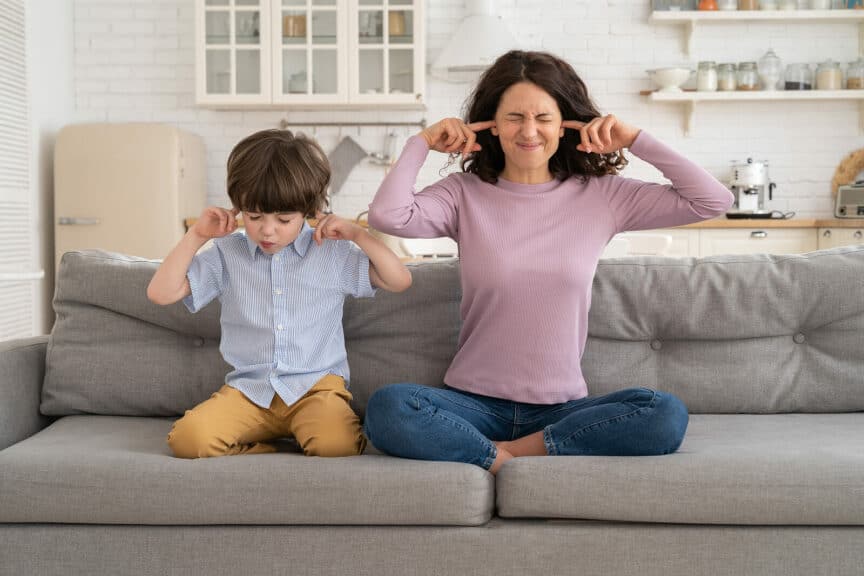Noise is a common cause of hearing loss. Though you may be thinking that sound has to be especially loud to harm hearing health, you are likely exposed to everyday noises that can cause hearing loss.
Noise Induced Hearing Loss
Over 48 million people have hearing loss. This medical condition can be caused by several factors including loud noise. One time or regular exposure to loud noise can cause noise induced hearing loss which occurs when the sensory cells in the inner ear are damaged. There are thousands of these cells in the cochlea and they play a critical role in how sound is processed. Sensory cells receive sound waves and convert them into electrical signals that the auditory nerve carries to the brain. The brain continues processing these signals, including assigning meaning to them which is how we are able to understand what we hear.
Loud noise can desensitize and weaken sensory cells, reducing their ability to effectively translate soundwaves for the brain. This results in the brain receiving less auditory information, producing hearing loss. Unlike other types of cells we have, sensory cells in the inner ear do not regenerate. There are also no ways to fix any damage they experience from loud noise. This means that this damage is permanent, causing chronic noise induced hearing loss. The irreparability of damage from loud noise highlights the importance of practicing preventative measures that protect hearing health.
Everyday Sources of Loud Noise
The Hearing Health Foundation estimates that over 30 million people are regularly exposed to excessive noise levels. There are numerous ways we encounter hazardous noise levels on a daily basis – work, social life, household tools and appliances, music etc. The following list from the Centers for Disease Control and Prevention (CDC) highlights how long it takes for exposure to the following noises to cause hearing loss:
- Gas-powered lawn equipment: 2 hours
- Motorcycles: 50 minutes
- Subways, car horns, sports events: 15 minutes
- Personal audio devices set at maximum volume, loud music venues: 5 minutes
- Barking or yelling in ear: 2 minutes
- Standing close to sirens: less than two minutes
- Fireworks: less than two minutes
This highlights how easy it can be to be exposed to sound that can damage your hearing health permanently. But fortunately, noise induced hearing loss is 100% preventable.
Tips to Protect Your Hearing Health
There are several safety measures you can implement in your everyday life to prevent noise induced hearing loss. This includes the following strategies:
- Wear hearing protection: there are different types of hearing protection including earplugs, over the ear headphones, earbuds, and earmuffs. These items provide a physical barrier and blocks noise and this reduces the amount of loud noise you absorb. It is important to carry hearing protection with you if you plan on moving through noisy spaces. Also, if you work in a noisy environment, be sure to discuss hearing protection with your employer who is legally obligated to provide it.
- Invest in noise cancellation: if you use headphones or earbuds often to listen to music, podcasts, talk on the phone etc.; that you can benefit from noise canceling options. This technology is designed to reduce background noise which prevents people from having to increase the volume when moving through noisier spaces.
- Measure noise levels: measuring the noise levels in your environment and that of your devices allows you to then adjust your exposure time. There are several apps that measure decibels, examples include: NIOSH Sound Level Meter App (iOS), NoiSee (iOS), SLPnFFT Noise Meter (iOS), Sound Meter X (iOS), and SoundPrint (iOS and Android).
- Reduce exposure: there are many additional ways you can reduce your exposure to loud noise. This includes: taking listening breaks throughout the day, opting for quieter settings, avoiding noisy environments like restaurants during peak hours, driving with the windows rolled up, taking alternate routes to avoid construction sites and/or traffic etc. .
- Test hearing regularly: another practice that is important is having your hearing health regularly evaluated. Hearing tests involve a painless process that measures your hearing capacities in both ears. This identifies any hearing loss and what your hearing needs are. If you don’t have any hearing loss, this is still a great way to monitor your hearing health.
Practicing these safety measures can help prevent noise induced hearing loss. Contact us to learn more about custom hearing protection and other resources and well as services that are available to support your hearing health.

